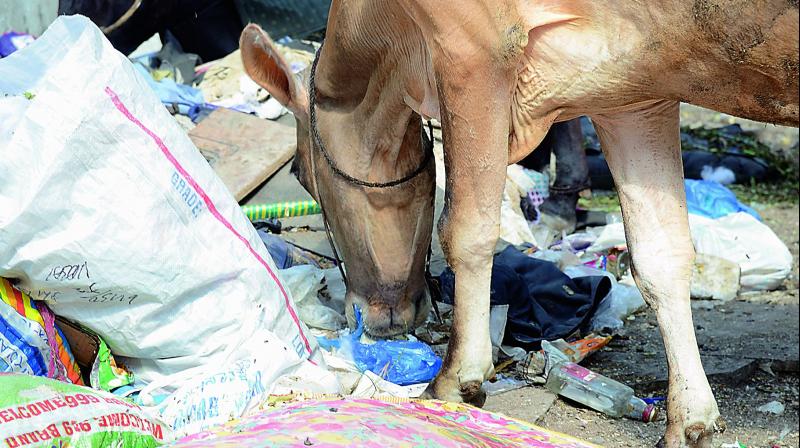Tonnes of plastic waste in Hyderabad choking cows to death
In India, 60 cities produce 15,342 tonnes of plastic waste per day of which more than 6,000 tonnes remain uncollected.

Hyderabad: The city generates 4,500 metric tonnes of waste every day, of which 2,500 tonnes comprises plastic in the form of bottles and bags. According to the Plastic Waste Management and Handling Rules 2011, the municipal authorities are required to set up plastic waste management system but this has remained only on paper.
Most of this plastic clogs drains and creates a problem in sewage management. After last week’s sudden downpour, GHMC commissioner Dr B. Janardhan Reddy said the drains were choked by plastic bags, resulting in rainwater stagnating on the roads.
In India, 60 cities produce 15,342 tonnes of plastic waste per day of which more than 6,000 tonnes remain uncollected and littered according to the data collected by Central Pollution Control Board.
During the monsoon, the plastic travels through the drains into water bodies which meets the river and then the sea. Stray domestic animals like cows are seen chewing food from the plastics and often ingest the bags themselves. This results in their choking to death. Post-mortem of dead cows has revealed the presence of a large amount of plastic bags.
The NGO Avaaz estimates 100 million plastic bottles are thrown away everyday, choking oceans with plastic waste. Various groups are pushing countries and governments to ban single-use plastics and allow the oceans to breathe again. Countries like Indonesia have committed to a 70 per cent reduction in plastic waste. With small countries taking this initiative it is important for larger countries to also opt for the same.
Avaaz has launched a campaign to clean the oceans: Its survey found that five nations were dumping most of the plastic that was found at sea. To ensure that the top polluters take up strong action, Avaaz is working with the United Nations to pressurise the governments to cut down on the use of plastic.

